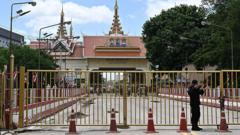This article explores the rising ecological crisis in Thailand, where mining operations in Myanmar are contaminating vital water sources. Reports indicate toxic metals, particularly arsenic, are affecting rivers like the Kok. Local communities express fear over deteriorating health impacts connected to the pollution.
Ecological Crisis Looms Over Thailand from Myanmar's Rare Earth Mining

Ecological Crisis Looms Over Thailand from Myanmar's Rare Earth Mining
Unregulated mining activities in Myanmar, driven by Chinese companies, are causing severe pollution in Thai waterways, with arsenic levels reaching alarming heights.
The Kok River, known for its crystal-clear waters, has become a pollution hotspot, where hazardous mining activities are creating dire environmental consequences. Phra Maha Nikhom, an abbot near Thailand’s border with Myanmar, recalls a time when the Kok was pristine, filled with life and good for swimming. Today, however, it is a no-go zone, tainted by toxic metals from unregulated rare earth mining in Myanmar led primarily by Chinese companies.
Recent government data indicates concerning spikes in arsenic and other dangerous heavy metals in vital waterways, such as the Kok River and Mekong River, impacting communities reliant on these water sources. Once clear, the Kok now flows a dismal brown, burdened by mining sediment and pollutants. Local residents are already experiencing negative health consequences, with reports of skin problems and looming fears of severe illnesses connected to the toxins, including various cancers affecting lung, bladder, and kidney health.
As the rare earth mining sector expands in Myanmar's border regions, more than 300 mines have emerged, prompting an outcry from citizens and environmental activists alike. The ramifications of this mining crusade don’t just threaten local ecosystems; they are also having a tangible impact on regional water supplies, raising alarms for neighboring countries like Thailand.
Farmers and their families near the Kok River have had to adapt their practices, now relying on piped-in water supplies due to the dangerous quality of the river water, highlighting a significant alteration to traditional ways of life brought on by environmental degradation.
Despite continued efforts by local communities to draw attention to these issues, regulation and action remain scarce. For many, the hope persists for stronger regulatory measures and collaborative action between countries to protect not just their health, but the health of critically important waterways that are lifeblood for many throughout the Mekong region.





















